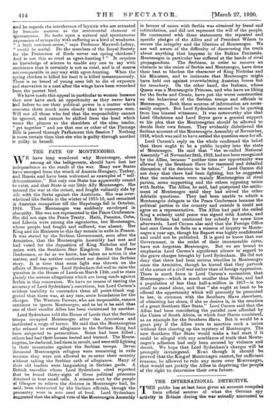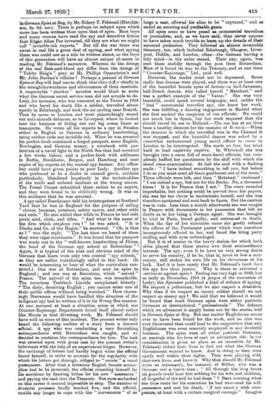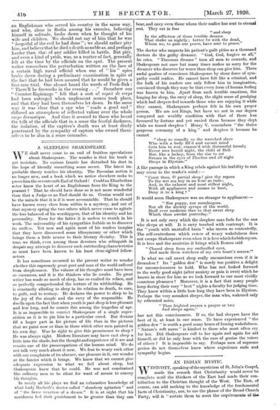THE INTERNATIONAL DETECTIVE.
T' public has Misfit been given an account coinplled from official sources of what the German spy activity in Britain during the war actually amounted to of this generation will have an almost unique pleasure in tidy mind—in the order stated. Their pay, again, was reading Mr. Felstead's narrative. Wherein do the doings sent them stolidly through the post from Rotterdam. of the real flesh-and-blood spy differ from the doings of Most of it found its way to.the Treaaury, and at one time " Tubby Haig's " prey, or Mr. Phillips Oppenheim's and " Counter-Espionage," Ltd., paid well. Mr. John Buchan's villains ? Perhaps a perusal of German However, the reader must not be depressed. Some Spie,g at Bay will lead one to think that they cliff3r chiefly in really fine dramas were played, and there was at least one the straightforwardness and obviousness of their methods. of the beautiful female spiea of fiction—a ha Lf-Javanese, A respectable " shocker " novelist would blush to write half-Dutch dancer, who called herself " Matahari," and what the German secret service man did not scruple to do. was a perfect example of the "Vamp." She was very Lody, for instance, who was executed at the Tower in 1914 beautiful, could speak several languages, and, unlike the and who faced his death like a soldier, travelled about " dud " commercial traveller spy, she knew her work. openly in Edinburgh, and took the air cycling near Rosyth. She was fulfilling a dancing engagement in Madrid when Then he came to London and went painstakingly round she first excited the suspicion of our officials. We could our anti-aircraft defences, so to Liverpool, where he looked not touch her in Spain, but her work required that she into the business of fitting out our big ocean liners as should travel by sea to Holland.—The sea has at no time transports. He wrote all his reports to a spy in Sweden been a healthy element for the enemies of Britain.—When either in English or German m ordinary handwriting, the steamer in which she travelled was, in the Channel it using neither code nor invisible ink. When he was arrested was stopped, and the beautiful dancer was asked by a his pocket-book contained a forged passport, some English, somewhat embarrassed young naval officer to come to Norwegian, and German money, a notebook with par- London to be interrogated. She made no fuss, but tried ticulars of a naval fight in the North Sea that had occurred hard to lead captivity captive. In Whitehall she was a few weeks before, and a pocket-book with addresses brought into a room full of stern-faced officials, but corn- in Berlin, Stockholm, Bergen, and Hamburg and neat pletely baffled her questioners by the skill with. which she copies of his.reports to the central spy bureau. Any office- stood cross-examination. At last she said with a flashing boy could have given points to poor Lody. Another spy smile : "1 have indeed something to tell you, but before who professed to be a dealer in canned goods, sardines I do so you must send all these gentlemen out of the room." particularly, blundered hopelessly in the technicalities Three officials were left, and then " Matahari " confessed : of the trade and ordered sardines at the wrong season. "I am indeed a spy, but not for the Beebe. No, a thousand The Postal Censor submitted these orders to an expert, times 1 It is for France that I act." The story sounded and they were found to be childishly wrong. It was on improbable, but nothing could be proved from her papers, this ...evidence that he was arrested. she wan far too clever to incriminate herself, and she was A spy called Busch,mann told, his interrogators .at Scotland therefore cautioned and sent back to Spain. But the caution Yard that he was in England for the purpose of selling was in vain. Less than a month afterwards she was caught "cheese, bananas, potatoes, safety razors, and other odds in France with documents in her possession that left no and ends." He also added that while in France he had sold doubt as to her being a German agent. She was brought pieric acid, cloth, and rifles. "And what is the name of to trial in Paris, found guilty, and sentenced to death. the firm which employs you I" he was asked. "It is When the day of her execution came she gently refused Dierks and Co. of the Hague," he answered. "Oh, is that the offices of the Protestant pastor which were somehow so ? " was the reply. "The last time we heard of them incongruously offered to her, and faced the firing party they were cigar merchants." It was found that his passport smiling and with eyes nnbandaged. was made out in the "well-known handwriting of Flores,. But it is of course to the heavy stakes. for which both the head of the German spy school at Rotterdam " ! sides played that these stories owe their extraordinary Again, it is typical of the neat and obvious mind of the interest. The spy, even if he have no very strong desire German that there were only two central "spy schools," to serve his country, if he be, that is, more or less a mer- as they are rather tantalizingly called in this book. (It cenary, still stakes his own fife on his cleverness or his would be interesting to hear of what the curriculum con- luck. And it is here surely that Mr. Felstead's book does gated.) One was at Rotterdam, and sent its spies to the spy less than justice. Why is there so universal a England ; and one was at Barcelona, which " served " sentiment against spies ? Feeling ran very high in 1916, but France. The naivete of the spies, too, was remarkable. as early as December, 1914 propos of the execution of The notorious Trebitsch Lincoln complained bitterly : Lody), the Spectator published a kind of defence of spying. "The dirty, deceiving English ; you cannot enter one of We respect a policeman, but we also respect a detective.
their public offices without being watched." How charm- Why then if we respect an enemy soldier should we not ingly Stevenson would have handled this situation of the respect an enemy spy We said that we believed it would indignant spy had he written of it in his Wrong Box manner. be found that most German spies were either patriotic At one moment at least a situation arose in which our Germans or international "professionals." The defence Counter-Espionage Department found itself placed rather which we advanced is amply 'borne out by the stories told like Morris in that diverting work. Mr. Felstead should in German Spies at Bay. Not one traitor Englishman seems have told us more of this incident. The present writer only ever to have been found for the work, and no clue was heard the following outline of a story from a discreet ever discovered that could lead to the supposition that any official. A spy who was conducting a very, flourishing Englishman was even remotely employed in any doubtful correspondence with Rotterdam was caught, and we business. The spies were all either patriotic Germans, decided to continue the correspondence for him, The task or neutrals who for love of cash or adventure (the latter was entered upon with great zest by the present writer's consideration is given no place as an incentive by Mr. informant with the help of an experienced forger. However, Felsteacl) risked their lives to find out what the German the exchange of letters had hardly begun when the official Government wanted to know. And in doing 80 they were found himself, in order to account for the regularity with surely well within their rights. They were playing with which his letters got. through, obliged-to "create " a venal their own lives, and knew it. Why then should Mr. Felstead postmaster. After that a fictitious English female smote- write so inhumanly, for instance, of Muller, who was a plice had to be invented, the official consoling himself for German and a brave man "All through the long hours his exertions by drawing bribes for his new' assistants" his guards could hear him sobbing for his wife and children, and paying the cash into the Treasury. But onoe embarked all forgetful of the evil he had dons"? Next morninic when on this career it seemed impossible to stop. The number of the time came for his execution he had recovered his self- dramatis personae finally reached five, and the official, possession and met his death, "if not exact y with corn- unable any longer to cope with the " movements " of so posure, at least with a certain resigned courage." Imagine more has beeu Ns-rates than upon that of spies. Most boys All spies eeem to have posed as commercial travellera. and many women have read the spy and detective fiction or journalists, and, aa we have said, they never appear that Edgar Allan Poe inveuted, till they are what we might to have taken much trouble to learn up the details of their call " invisible-ink experts." But till the war there was assumed profession. They followed an almost invariable. an Englishman who served his country in the same way, and who, alone in Berlin among his enemies, believing himself in solitude, broke down when he thought of his wife and children. We should not say of him that he was forgetful of the evil he had done "; we should rather pity him, and believe that he died a death as noble as, and perhaps harder than, that of any soldier killed in battle. But pity, and even a kind of pride, was, as a matter of fact, generally felt at the time by the officials on the spot. The present writer remembers the perturbation written on the face of a certain high naval official when one of " his " spies broke down during a preliminary examination in spite of the fact that he had been assured that he would be given a first-rate trial. One almost heard the words of Pooh-Bah : "There'll be fireworks in the evening. . ." Somehow our " Counter-Espionage " felt that a sort of esprit de corps had been outraged when unpleasant scenes took place, and that they had been themselves let down. In the same way it was clear that a spy who "made a good end" diffused an atmosphere of reflected valour over the whole corps dramatique. And thus it seemed to those who heard the talk of the officials that in a sense the fearful darkness, the isolation, of the captive's death was at least dimly penetrated by the sympathy of captors who owned them- selves to be also in a sense comrades.




































 Previous page
Previous page